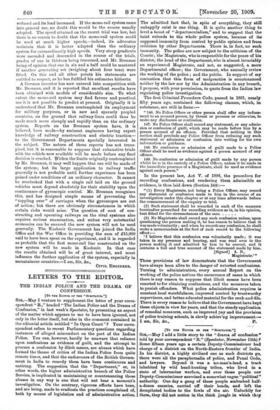LETTERS TO THE EDITOR.
THE INDIAN POLICE AND THE DRAMA OF CONFESSION.
[To THE EDITOR 07 TER " SPECTATOR:1 Si,—May I venture to supplement the letter of your corre- spondent " R.," headed "The Indian Police and the Drama of Confession," in last week's Spectator, by presenting an aspect of the matter which appears to me to have been ignored, not only in the letter itself, but also in the comment contained in the editorial article entitled "In Open Court" ? Your corre- spondent refers to recent Parliamentary questions regarding instances of alleged misconduct on the part of the Indian Police. You can, however, hardly be unaware that reliance upon confessions as evidence of guilt, and the attempt to procure a confession by illicit means, are abuses which have formed the theme of critics of the Indian Police from quite remote times, and that the endeavours of the British Govern- ment in India to remedy them have been continuous and untiring. The suggestion that the "Department," or, in other words, the higher administrative branch of the Police Service, is implicated in maintaining or countenancing these abuses in any way is one that will not bear a moment's investigation. On the contrary, vigorous . efforts have been, and are being, made to eradicate the practices complained of, both by means of legislation and of administrative action, The admitted fact that, in spite of everything, they still unhappily exist is one thing. It is quite another thing to
level a taunt of " departmenta1ism," and to suggest that the taint extends to the whole police system, because of its supposed immunity from control by public opinion and from criticism by other Departments. There is, in fact, no such immunity. The police are now subject to the criticism of the Courts ; the Magistrate, who is responsible for the peace of his district; the head of the Department,who is almost invariably an experienced Magistrate, and not, as suggested, a mere Departmental officer; the Government, who annually review the working of the police ; and the public. In support of my contention that this form of malpractice is countenanced neither by the law nor by the Administration in any branch, I propose, with your permission, to quote from the Indian law regulating police investigation.
The first Criminal Procedure Code, passed in 1861, nearly fifty years ago, contained the following clauses, which, in substance, are still in force :—
" 146. No Police Officer or other person shall offer any induce- ment to an accused person, by threat or promise or otherwise, to- make any disclosure or confession.
147. No Police Officer shall record any statement, or any admis- sion or confession of guilt, which may be made before him by a person accused of an offence. Provided that nothing in this section shall preclude any Police Officer from reducing any such statement or admission or confession into writing for his own information or guidance.
148. No confession or admission of guilt made to a Police Officer shall be used as evidence against a person accused of any offence.
149. No confession or admission of guilt made by any person whilst he is in the custody of a Police Officer, unless it be made in the immediate presence of a Magistrate, shall be used as evidence against such person."
In the present law, Act V. of 1898, the procedure for recording confessions, and rendering them admissible as evidence, is thus laid down (Section 164) :— "(1) Every Magistrate, not being a Police Officer, may record any statement or confession made to him in the course of an investigation under this chapter or at any time afterwards before the commencement of the enquiry or trial.
(2) Such statement shall be recorded in such of the manners hereinafter prescribed for recording evidence as is, in his opinion, best fitted for the circumstances of the ease (3) No Magistrate shall record any such confession unless, upon questioning the person making it, he has reason to believe that it was made voluntarily ; and when he records any confession, he shall make a memorandum at the foot of such record to the following effect
'I believe that this confession was voluntarily made ; it was taken in my presence and hearing, and was read over to the person making it and admitted by him to be correct, and it contains a full and true account of the statement made by him. [Signed] A. B., Magistrate.'
These provisions of law demonstrate that the Government have always been alive to the danger of extorted confessions. Turning to administration, every annual Report on the working of the police notices the occurrence of cases in which there is any reason to suppose that illicit means have been resorted to for obtaining confessions, and the measures taken to punish offenders. What police administration requires is constant local watchfulness, improved control by trustworthy supervisors, and better-educated material for the rank-and-file.
There is every reason to believe that the Government have kept these objects in view for years, and that the steady application of remedial measures, such as improved pay and the provision of police training schools, is slowly achiel'ng improvement.—.I am, Sir, &c., P.
























































 Previous page
Previous page